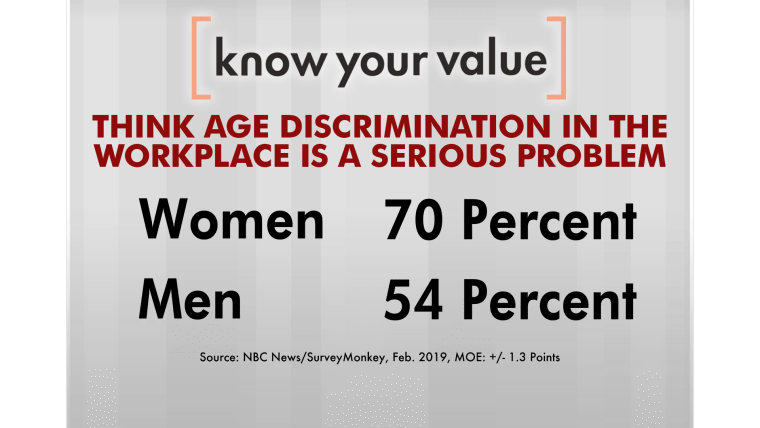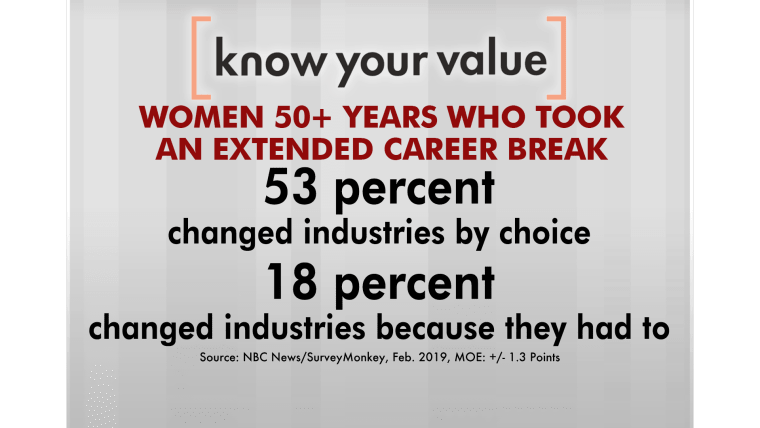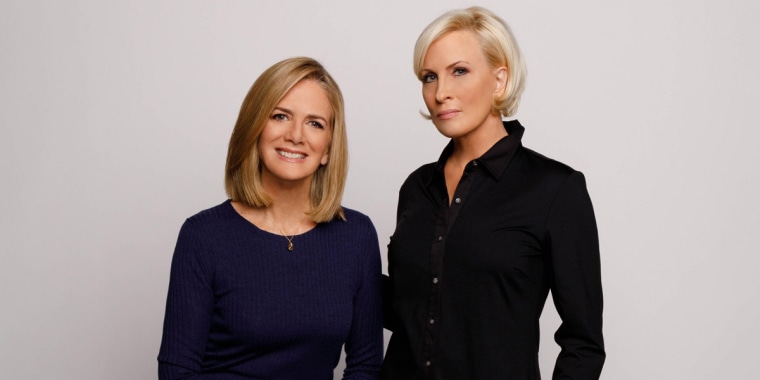Women are harder hit by workplace ageism more than men, according to a new study. But that isn’t stopping women in their 50s and beyond from successfully pivoting careers even after taking time off.
Most women — 70 percent — believe age discrimination in the workplace is a serious problem, compared to 54 percent for men. Meanwhile, 31 percent of women over 50 have personally experienced age discrimination at the office, according to the study by the NBC News Polling Unit and Survey Monkey.
Know Your Value founder Mika Brzezinski recently spoke about the nationwide survey, which 11,000 women and men participated in, with Diane Flynn, CEO of ReBoot Accel, a career re-entry program. Also joining them were Ginny Brzezinski co-author of the upcoming book “Comeback Careers: Rethink, Refresh and Reinvent Your Success — At 40, 50 and Beyond” and Lesley Jane Seymour, former magazine editor and founder of women’s business platform Covey Club.
Women who take breaks from the workforce and return can have an even harder time combating ageism, noted Flynn.

“They're not current with today's technologies. They're not connected with a professional network. And they have no confidence,” said Flynn. “And the confidence part was what killed me because I had worked with a lot of these women as volunteers and I thought they have so much to offer...And the good news is that confidence can be easily regained, but it takes a little bit.”
Despite the challenges, the panel discussed ways that women are not only combating ageism in the workplace but are thriving. The women also gave five tips for fighting ageism in the workplace:
Stay up-to-date on your industry.
Ginny Brzezinski encouraged women to keep up with their industries. She pointed to a good friend who was out of the workforce for 15 years but was able to re-enter at the top.
“She kept up with everything in her industry. She was watching TED talks, she was going to conferences, she knew what was going on,” Ginny Brzezinski said. “So, when she went into her interview, she was able to have a conversation and know what she was talking about.”
Staying updated includes working on your digital footprint, Ginny Brzezinski said.
“Don't be haphazard about what you're putting in there,” she said. “...Rev up your networks. Get out there and start talking to people. Have strategic conversations. You don't have to talk about your kids or talk about the weather. Talk about what people do for work.”
Uplift other women.
According to the survey, 70 percent of women aged 18 to 34 think age discrimination in the workplace is a serious problem, compared to 73 percent of women who are 50 and older.
The panel argued that these statistics represent an important connection that women feel across generations.
“Here's our bridge...Instead of fighting with each other, I think we bring that bridge and start that conversation, if everybody's feeling that they're being discriminated against,” Seymour said.
“We have to stop discriminating against each other,” Seymour said. “If you're the HR person and you're being encouraged to ding a woman because of her age, how about we all fight back?...Don't do it. Out it, we need whistleblowers within HR.”
Own your time off.
Many women take time off to raise children and re-enter the workforce later in life. They worry that their age combined with their hiatus has deemed them irrelevant, according to Flynn, but it shouldn’t feel that way.
“We always encourage them to re frame what they did during their time off,” said Flynn. “Whether you're paid or not, you developed valuable skills that you can bring to the market. And women tend to discount anything for which they're not paid. When they don't get this paycheck, they think, I didn't do anything...But they, they led volunteer organizations. They served on boards, they raised money, they ran events, they did lots of things that are a value to future employers.”

Don't be afraid to pivot.
Many women are pivoting careers later in life. Some of them are forced to due to ageism, according to Flynn. However, others are choosing to do so by choice.
“They have something that they feel strongly about that has social impact,” Flynn said. “So we have a lot of women who want to do something in mental health or sustainability or something where they really care...They do their own thing is because they want a little bit more control over their schedule in their 50s or 60s. They may have grandchildren; they may have kids living in other cities.”
Ginny Brzezinski said that it’s common to pivot after a work hiatus, even by choice.
“They choose to do something different because maybe their values have changed,” Ginny Brzezinski said. “Maybe they picked up a new interest while they were out of the workforce. Sometimes pivoting is a good thing.”
Know your value.
Flynn said that women over 50 have issues with confidence, especially when they’re returning to work after a hiatus. She encouraged these women to find and own their value.
“We’re finding is the biggest confidence boost is when we play back to them the value they bring,” Flynn said. “And it's the things you'd expect. It's judgment, it's experience, it's wisdom, it's pattern recognition. You know, they've seen it, they've done it.”
The survey found that 17 percent of adults with work experience feel the need to conceal their age. Mika Brzezinski encouraged people to stop hiding.
“I’m 52,” said Mika Brzezinski “...I share my age. I'm tired of hiding behind things.”
Seymour noted that people shouldn’t be afraid of their own age.
“It's that same stigma is that you're too old. You don't get it. You're over the hill, you're disconnected, you're slow...But it's all refuted,” Seymour said.
